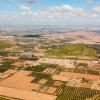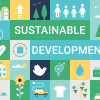Exploratory Modeling of Human-natural Systems (EM) focuses on the development of integrative models of different complexity to better understand complex feedbacks in human-natural systems.
Over the next decade, IIASA research will address itself to transformational changes towards sustainable social-economic-environmental systems. To underpin this research with methodological advances, the Exploratory Modeling of Human-natural Systems Research Group (EM) focuses on three modeling areas:
- Socioeconomic complexity: Micro-level detailed models that account for socioeconomic complexity, for instance, models with explicit representation of individual behaviors and their interactions that allow studying distributional impacts at different spatial and temporal scales; and models that realistically represent financial transactions, trade flows, and supply chains linked to biophysical sub-models.
- Integrative Earth systems models: Intermediate complexity models of Earth systems; evolutionary dynamics of Earth’s ecosystems; and exploratory modeling of linkages between socioeconomic and Earth systems.
- Macro-level systems models: Stylized models to address a multitude of challenges and problems related to the transformation to sustainability.
These models are complemented and supported by the area of:
- Model processing and analysis: Multiple equilibria, regime shifts, tipping points, model sensitivity, robust decision making, optimal responses, model validation, distributed modeling and decision making, tradeoffs, and adaptive dynamics.
EM deploys a flexible multi-model approach that involves stylized models, intermediate-complexity models, and micro-level detailed simulators. To account for socioeconomic complexity, EM exploits the digital revolution and makes use of the progress in computing capabilities to develop micro-level detailed economic simulators, such as agent-based models that allow studying the economy out of equilibrium, account for heterogeneous agents, and relaxes the assumption of rational expectations.
Intermediate complexity models of Earth systems enable investigating these systems on long timescales or at reduced computational cost and make the inclusion of previously unincorporated earth-systems and feedback effects feasible. Furthermore, EM contributes to the development of methods and models for eco-evolutionary dynamics, in particular the theory of adaptive dynamics and more detailed eco-genetic models to address biodiversity in Earth’s ecosystems.
Stylized models of different processes are developed and used for hypothesis testing and to explore the richness of systems dynamics including, non-linearities, tipping points, etc. Model processing and analysis addresses itself to methods and approaches from the theory of dynamic systems, adaptive dynamics, evolutionary game theory, optimal control theory, stochastic optimization, mathematical statistics, model linkage, and reinforcement learning, among other areas.
Projects
Staff
News

09 April 2024
Understanding the impacts of migration on the Austrian economy

28 February 2024
A reliable food supply in West Africa requires smarter planning for low-yield events

27 February 2024
Slovak delegation from the Institute of Economic Research visits IIASA
Events
Focus
27 June 2024
Developing a collaborative modeling framework for sustainability transformations

11 November 2023
Pursuing the urban utopia

Publications
Feichtinger, G. & Wrzaczek, S. (2024). The optimal momentum of population growth and decline. Theoretical Population Biology 155 51-66. 10.1016/j.tpb.2023.12.002. Ganti, G. , Gasser, T. , Bui, M., Geden, O., Lamb, W., Minx, J.C., Schleussner, C.-F., & Gidden, M. (2024). Evaluating the near- and long-term role of carbon dioxide removal in meeting global climate objectives. Communications Earth & Environment 5 (1) 10.1038/s43247-024-01527-z. Hansda, P., Kumar, S., Singh, S., & Garkoti, S.C. (2024). Assessing the influence of invasion of Lantana camara on vegetation attributes and soil properties across varied disturbance gradients in semi-arid forests of Aravali hills, Delhi. Plant Ecology 10.1007/s11258-024-01441-6. Li, K., Gao, L., Guo, Z., Dong, Y., Moallemi, E.A., Kou, G., Chen, M., Lin, W., Liu, Q., Obersteiner, M. , Pedercini, M., & Bryan, B.A. (2024). Safeguarding China’s long-term sustainability against systemic disruptors. Nature Communications 15 (1) 10.1038/s41467-024-49725-9. Peichel, C.L., Bolnick, D.I., Brännström, Å., Dieckmann, U. , & Safran, R.J. (2024). Speciation. Cold Spring Harbor Perspectives in Biology a041735. 10.1101/cshperspect.a041735.







